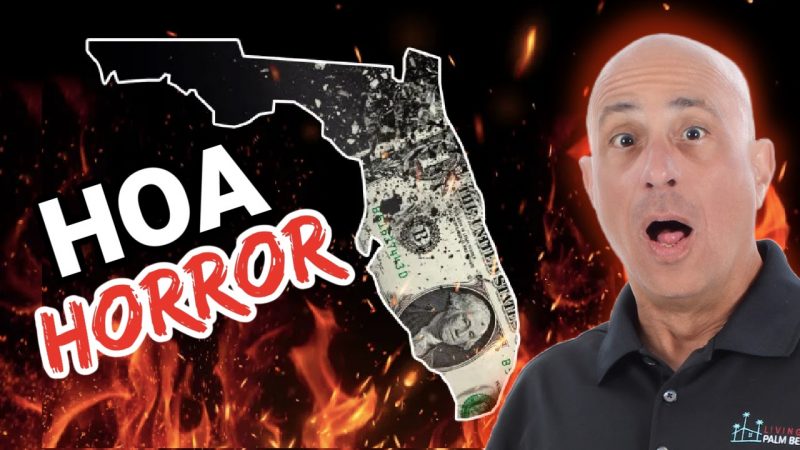
SOARING HOAs in FLORIDA - Are Florida Homeowner Associations a TRAP
Are you considering a move to Florida but wondering are SOARING HOAs in FLORIDA – Are Florida Homeowner Associations a TRAP? If so, you’re not alone. In recent months, there has been a lot of buzz about rising HOA costs, but before you let clickbait headlines scare you away, let’s delve into the truth behind the headlines.
What’s Really Happening with HOA Fees in Florida?
Let’s face it: sensational headlines grab attention. But as someone deeply involved in Florida’s real estate scene, I’m here to provide clarity. While it’s true that HOA fees have seen increases, not every HOA is created equal. As a hub for new construction, South Florida offers unique insights into the evolving landscape of HOA fees. Remember, understanding the specific factors influencing HOA fee variations is crucial for making informed decisions in real estate investment. So, don’t let sensationalism cloud your judgment; seek comprehensive knowledge to navigate the market effectively.
Understanding the Florida Landscape: A Diverse State with Diverse HOAs
Florida is vast and diverse, with differences in HOA culture. However, it’s southeast Florida that often grabs the spotlight as the land of HOAs. From gated communities with strict regulations to more laid-back neighborhoods, the spectrum of HOAs reflects the state’s varied landscapes and demographics. Whether you seek meticulous landscaping or vibrant social scenes, Florida’s HOAs offer a spectrum of experiences tailored to residents’ preferences.
HOA Statistics in Florida: What You Need to Know
Did you know that Florida ranks as the number one state for HOAs? With approximately 45% of homes falling under HOA jurisdiction, understanding the dynamics of these associations is crucial for anyone considering a move. HOAs, or Homeowners Associations, play a significant role in governing communities, regulating everything from lawn maintenance to exterior paint colors. While they offer benefits like community amenities and property value preservation, they also come with rules and fees that can impact homeowners’ freedom and finances.
Mitigating Risks: Strategies for Managing HOA Costs
When considering purchasing a property governed by a homeowners association (HOA), it’s essential to understand the financial implications of the associated fees. Condos typically have higher HOA fees due to shared amenities and maintenance responsibilities, which can include landscaping, security, and common area upkeep. Additionally, owners may have less control over insurance costs, as these are often managed collectively by the HOA. Conversely, single-family homes and townhouses may offer more autonomy in managing expenses, allowing homeowners to select their insurance policies and oversee maintenance directly. Ultimately, weighing the benefits and drawbacks of different property types and their associated HOA structures is crucial for making an informed decision.
The Truth about Insurance and Special Assessments
One of the key factors driving HOA fee increases is insurance costs. Older homes, in particular, may face higher insurance premiums due to past storm-related claims. Additionally, special assessments can catch homeowners off guard, leading to unexpected financial burdens. Moreover, as communities age, maintenance costs tend to rise, necessitating higher HOA fees to cover repairs and upgrades. Changes in local regulations or laws can also impact HOA budgets, prompting adjustments in fees to remain compliant and adequately funded. Finally, amenities such as pools, gyms, or community centers may require increased maintenance or updates over time, contributing to fee hikes.
Avoiding Victimhood: Making Informed Decisions
One common pitfall is falling victim to seemingly attractive but unsustainable HOA fees. Properties with low purchase prices may come with high association fees, setting buyers up for financial strain down the road. It’s essential to look beyond the initial price tag and consider the long-term implications of HOA fees. Additionally, prospective buyers should thoroughly review the HOA’s financial documents, including budgets and reserve funds, to gauge the association’s financial health. Engaging in due diligence can prevent unexpected financial burdens and ensure a more stable homeownership experience. Taking the time to understand the full scope of HOA fees can ultimately lead to a more informed and financially sound investment decision.
Navigating HOA Fees: The Path Forward
Despite the challenges posed by rising HOA fees, there are strategies for navigating this landscape successfully. By working with experienced real estate professionals who understand the nuances of Florida’s HOA market, you can make informed decisions and find a home that meets your needs without breaking the bank. Researching the track record of different HOAs can provide valuable insights into their financial stability and management practices. Additionally, carefully reviewing the HOA’s governing documents and fee structures can help you anticipate any potential financial burdens. Negotiating with sellers to cover a portion of HOA fees or seeking properties in communities with lower fees are also viable options for mitigating costs. Remember that proactive communication and thorough due diligence are key to managing HOA expenses effectively.
We Love South Florida!
If you need to buy or sell a home in South Florida, please click here for our contact page or click this link to schedule a Zoom or phone call with me. Our specialty is knowing the South Florida area so you don’t have to!
Also, click here for our YouTube page. Lots of great videos there.
Thanks for visiting our website!



![EXTREMELY AFFORDABLE New Construction Near Palm Beach Florida [Preserves at Park Trace]](https://living-inpalmbeachflorida.com/wp-content/uploads/2024/10/PALM-BEACH-affordable-2-800x450.png)